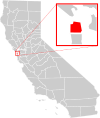Diamond Heights, San Francisco: Difference between revisions
| Line 7: | Line 7: | ||
==References== |
==References== |
||
*[http://www.spur.org/documents/990301_article_01.shtm San Francisco Planning and Urban Research Website] |
*[http://www.spur.org/documents/990301_article_01.shtm San Francisco Planning and Urban Research Website] |
||
* *[http://www.eichlerforsale.com/Diamond_Heights |
* *[http://www.eichlerforsale.com/Diamond_Heights Diamond Heights mid-century modern housing tract developed by architect Claude Oakland for Eichler Homes] |
||
{{Neighborhoods_of_San_Francisco}} |
{{Neighborhoods_of_San_Francisco}} |
||
Revision as of 13:25, 11 June 2006
Diamond Heights is a neighborhood in San Francisco, California. It is located in the middle part of the city, roughly bordered by Diamond Heights Boulevard and Noe Valley on the east side and Glen Canyon Park on the west side. It was the San Francisco Planning and Urban Research Association's first project, intended to use redevelopment powers to use land on the hills in the center of the city to be developed with, rather than against, the topography. Few existing residents needed to be relocated for the redevelopment program, which included housing for a range of incomes, churches, schools, parks, and a commercial center.
Notable features of Diamond Heights include a shopping center on Diamond Heights Boulevard between Duncan Street and Gold Mine Way, and the San Francisco Police Department's police academy on Turquoise Way. George Christopher Playground is located behind the shopping center, and Walter Haas Playground is at the intersection of Diamond Heights Boulevard and Addison Street. School of the Arts high school and the California Youth Authority's Youth Guidance Center are both just northwest of Diamond Heights, at the intersection of Portola and Woodside.
Public transportation in Diamond Heights is provided by Muni's 35 Eureka and 52 Excelsior lines. Both connect to the Muni Metro system; the 35 goes to Castro Street Station and the 52 goes to Forest Hill Station. Additionally, the 52 connects to the Bay Area Rapid Transit system at the Glen Park Station.

